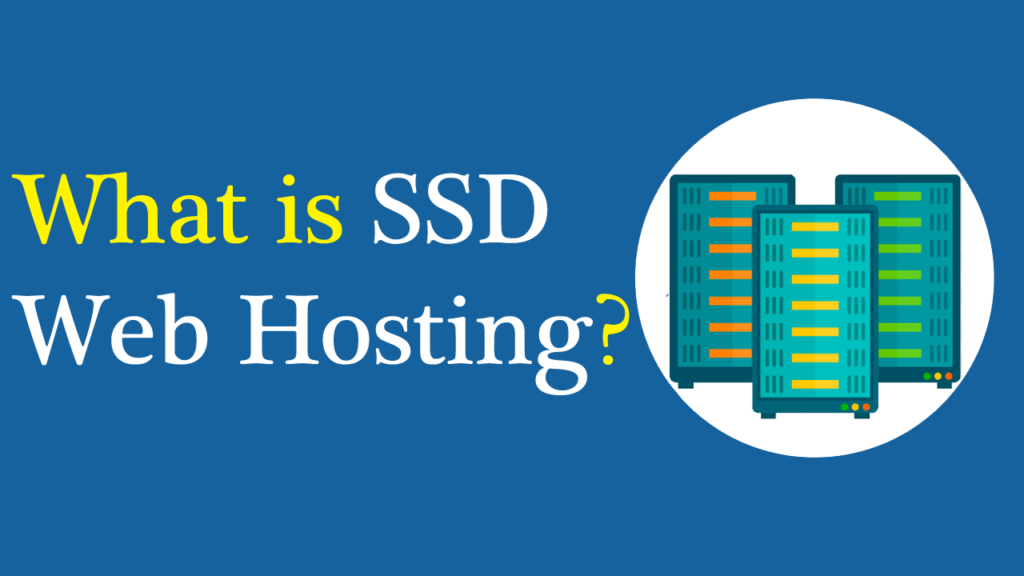When looking for web hosting services, you should be careful. You should consider their pricing, speed, security, support, ease of use, and more. When considering their speed, you should check whether they use HDDs or SSDs to store your website’s files and content.
If your web hosting provider uses HDDs (Hard Disk Drives) to store your website’s files and content, your website may be slow and experience frequent downtimes, resulting in a poor user experience. On the other hand, if your web host uses SSDs (Solid State Drives), your website may be faster and have less downtime, leading to a good user experience.
However, keep in mind that your website’s speed depends not only on the type of storage it uses but also on several other factors, including how your website looks and the distance between your web server and visitors accessing it.
As you have briefly heard about the benefits of SSD storage in web hosting, let’s talk about what SSD exactly is.
Table of Contents
What is SSD?
SSD (Solid State Drive) is a new generation of storage devices that store data on flash-based memory, giving you instant access to data. Unlike HDDs, they have no moving parts, making them more resilient against data loss.
A Solid State Drive contains a flash controller chip that keeps track of where the data is located and finds the requested data within nanoseconds. This makes it a faster storage device.
According to AOMEI Partition Assistant, a standard SSD drive can read data at about 550 MBps (megabytes per second) and write it at 520 MBps, while a fast hard disk drive (HDD) can read/write data at 125 MBps. This means an SSD drive is 4 times faster than an HDD.
There are several types of SSDs, including SATA SSDs, NVMe SSDs, PCIe SSDs, and SAS SSDs. Each one has its own set of features, advantages, and disadvantages.
As you have understood what SSD is, let’s discuss what SSD web hosting is.

What is SSD Web Hosting?
SSD web hosting refers to the hosting services that use solid-state drives instead of hard disk drives. As you know, an SSD has faster read/write speed and no moving parts, also making the hosting service and your website faster and more reliable.
What Are The Benefits of SSD Web Hosting?
SSD web hosting has several advantages over HDD web hosting, such as faster speed, more reliability, and being environmentally friendly hosting. Let’s talk about them in detail.
#1. Faster Website Speed
When a user accesses your website and it’s hosted on SSD web hosting, your web server will find and serve your website four times faster than if it were hosted on HDD web hosting. This faster website speed leads to a better user experience and higher search engine rankings.
#2. More Reliability
Unlike HDDs, SSDs have no moving parts which translate to less susceptibility to shock or vibration damage, so there’s a little chance that your website may down.
SSD web hosting operates in a wider range of temperatures, so your data will be safe and available.
#3. Environmentally Friendly
If we compare SSD web servers to HDD web servers in terms of energy efficiency, SSD ones consume less energy. This not only results in a lower energy bill but also helps the environment. In addition, reducing energy consumption costs assists the hosting companies to create affordable hosting plans.
The Downside of SSD Web Hosting For Web Hosts
The only downside of SSD web hosting is its drive cost; web hosting companies have to pay a premium price to switch to SSD web hosting. However, SSD hosting reduces the web host’s operating cost in the long run.
SSD storage is beneficial and has no disadvantages for website owners. Therefore, all website owners must look for SSD storage in web hosting services when launching a new website or changing the hosting service.
SSD Hosting VS HDD Hosting
There’re three main differences between SSD web hosting and HDD web hosting.
#1. Reliability
SSD web servers have no moving parts which translates to more availability. While HDDs have moving parts which means you’ll be concerned with overheating, loud whirring noises, or downtime.
#2. Read-Write Speed
HDD web servers might be able to read the data at a rate of 125 MBps, while a standard SSD reads the data at a rate of about 550 MBps.
The higher the read-write speed, the quicker your website’s content will be delivered to the end user. Thus, SSD web hosting serves the requested content quicker than HDD hosting.
#3. Energy Power Consumption
SSD web hosting takes a little energy to operate which is eco-friendly. While HDD web hosting needs more energy power to operate.
Overall, SSD web hosting is far better than HDD hosting in several aspects including speed, reliability, and energy power consumption.
Conclusion
You must look for SSD storage in web hosting services to get faster website speed and more reliability. I want to remind you that it’s becoming a standard in the hosting industry, so you can easily get SSD web hosting from reliable web hosts like Hostinger, which offers 100 websites, 100 GB SSD storage, free SSL certificates, free email accounts, weekly backups, a free domain, and more for only $2.99/mo when signing up for a 48-month billing cycle.
FAQs
What is SSD Hosting?
Any web hosting service that uses SSDs (Solid State Drives) instead of HDDs (Hard Disk Drives) for data storage is called SSD hosting.
What is HDD web hosting?
Web hosting services that use traditional hard disk drives in web servers to store data are called HDD hosting.
Is SSD hosting better than HDD hosting?
Yes, SSD hosting is better than HDD hosting in terms of speed and availability. This means if your website is hosted on SSD hosting, it will be faster and have higher uptime than if it were hosted on HDD hosting.
How much SSD storage does your website need?
It depends on what type of website you want to launch and what type of content (text, images, videos, downloads, etc.) you want to publish on it. For blog websites, 3-5 GB SSD disk space will be more than enough.
Is SSD Web Hosting Expensive?
Absolutely Not. The SSD storage device is expensive but NOT SSD web hosting


